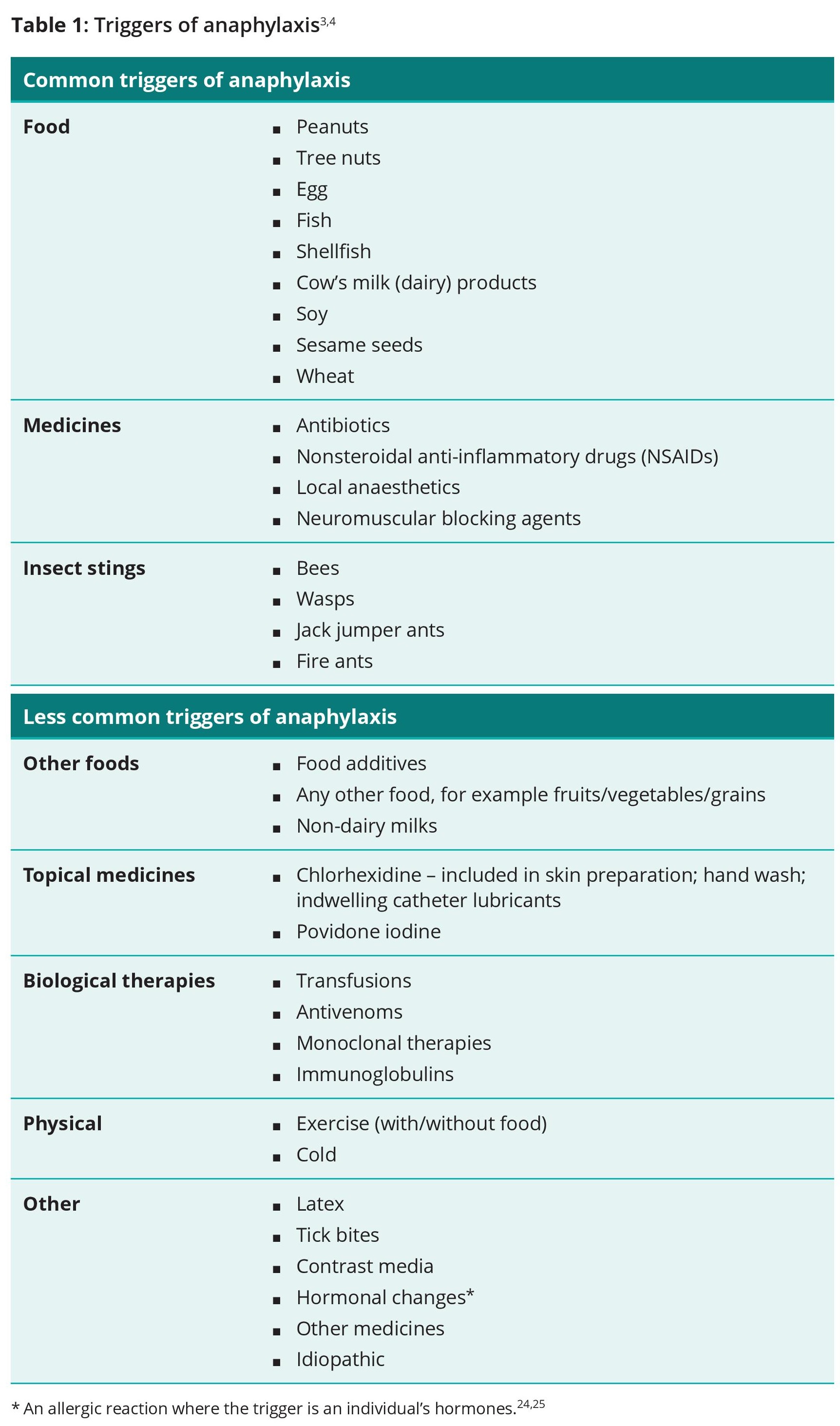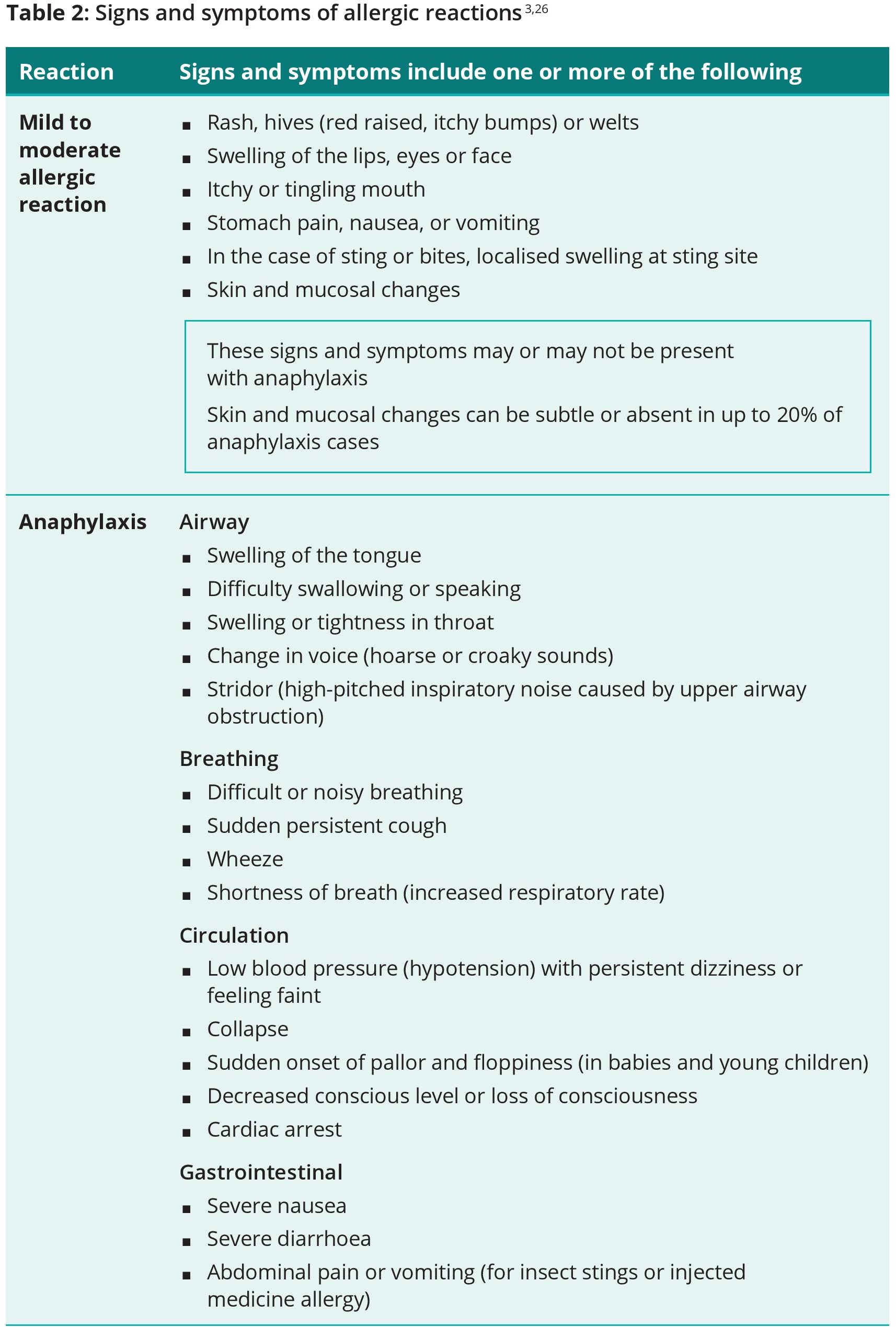Prompt recognition of anaphylaxis
Quality statement 1
A patient with acute-onset clinical deterioration with signs or symptoms of an allergic response is rapidly assessed for anaphylaxis, especially in the presence of an allergic trigger or a history of allergy.
Purpose
To improve the time to optimal diagnosis and treatment for people with anaphylaxis.
What the quality statement means
For patients
If you have sudden difficulty in breathing, swelling of your face, tightness in your throat, persistent dizziness, hives, or other symptoms that could indicate an allergic reaction, your clinician will assess if you are experiencing anaphylaxis, the most severe form of allergic reaction. Abdominal pain with or without vomiting can also be a sign of anaphylaxis, usually for people allergic to insect bites or stings.
A reaction can occur within minutes or several hours after exposure to a trigger (also called an ‘allergen’). Your clinician will ask about food and drinks in the past few hours, medicines used and any insect bites or stings, as these are the most common triggers of anaphylaxis.
A mild or moderate allergic reaction can rapidly become severe (anaphylaxis). Be aware of the symptoms and signs of anaphylaxis so you can recognise if this is happening.
If you have an allergy or have had anaphylaxis before, it is important to let your clinician know. If you have asthma, are at risk of anaphylaxis, and experience sudden difficulty in breathing, this should be treated as anaphylaxis.
For clinicians
Assess patients immediately for possible anaphylaxis if they present with rapid development of airway, breathing and/or circulation problems, with or without skin or mucosal changes. The presence of an allergic trigger or a history of allergy should heighten suspicion even if the patient is not in severe distress. Symptoms typically occur in two or more body systems, but this can be variable. The most common triggers of anaphylaxis are food, insect venom and medicines (Table1). After exposure to a trigger, the time until onset of signs and symptoms of anaphylaxis (Table2) may range from minutes to several hours.
Obtain a history from the patient, noting:
- Recent exposure to substances known to cause an allergic reaction
- Any known allergies for the patient, including previous reactions and treatment
- Any history of anaphylaxis.
Document the time of symptom onset in the patient’s healthcare record.
Consider patient risk factors that potentially contribute to fatal anaphylaxis (for example, older age and cardiovascular and respiratory diseases) and cofactors that are likely to amplify the severity of an allergic reaction (such as exercise or acute infection).
Common differential diagnoses include acute asthma, syncope, panic attacks and septic shock. Rule out other sudden-onset multisystem illnesses. However, a patient who experiences sudden difficulty in breathing, has asthma, and is known to be at risk of anaphylaxis, should be treated as having anaphylaxis.
Monitor patients with allergy symptoms who do not meet the criteria for anaphylaxis, to allow prompt recognition of progression of a mild-to-moderate allergic reaction to anaphylaxis. Reactions can progress to severe involvement of more than one body organ system and rapidly become life-threatening.
Rehearse the anaphylaxis management protocol regularly to ensure prompt recognition of anaphylaxis for patients presenting with allergic reactions.
Consider serial measurements of mast cell tryptase concentrations. Taken during anaphylaxis, results can be useful for identifying the trigger when reviewed after the event, usually by a clinical immunology or allergy specialist.
Table 1: Triggers of anaphylaxis

Table 2: Signs and symptoms of allergic reactions

For health service organisations
Ensure that an anaphylaxis management protocol that outlines clinical criteria (consistent with the ASCIA Acute Management of Anaphylaxis guidelines) is available and used consistently by clinicians. Confirm that clinicians have the skills and competency to promptly recognise the signs and symptoms of allergic reactions, including anaphylaxis.
Ensure that systems are in place for the continuing assessment of the patient experiencing an allergic reaction, to monitor for the possible progression of symptoms to anaphylaxis. This may include drills to ensure proficiency of relevant staff in the anaphylaxis management protocol.
Reporting of incidents of delayed recognition of anaphylaxis or missed anaphylaxis as an adverse event should be included in the quality management program – for example, through incident reporting and management.
Related resources
- Allergy & Anaphylaxis Australia (A&AA) signs and symptoms video: allergyfacts.org.au/allergy-anaphylaxis/signs-symptoms
- ASCIA e-training courses for health professionals (etraininghp.ascia.org.au/), developed by ASCIA to provide reliable clinician education including Anaphylaxis e-training for health professionals
For patients
If you have sudden difficulty in breathing, swelling of your face, tightness in your throat, persistent dizziness, hives, or other symptoms that could indicate an allergic reaction, your clinician will assess if you are experiencing anaphylaxis, the most severe form of allergic reaction. Abdominal pain with or without vomiting can also be a sign of anaphylaxis, usually for people allergic to insect bites or stings.
A reaction can occur within minutes or several hours after exposure to a trigger (also called an ‘allergen’). Your clinician will ask about food and drinks in the past few hours, medicines used and any insect bites or stings, as these are the most common triggers of anaphylaxis.
A mild or moderate allergic reaction can rapidly become severe (anaphylaxis). Be aware of the symptoms and signs of anaphylaxis so you can recognise if this is happening.
If you have an allergy or have had anaphylaxis before, it is important to let your clinician know. If you have asthma, are at risk of anaphylaxis, and experience sudden difficulty in breathing, this should be treated as anaphylaxis.
For clinicians
Assess patients immediately for possible anaphylaxis if they present with rapid development of airway, breathing and/or circulation problems, with or without skin or mucosal changes. The presence of an allergic trigger or a history of allergy should heighten suspicion even if the patient is not in severe distress. Symptoms typically occur in two or more body systems, but this can be variable. The most common triggers of anaphylaxis are food, insect venom and medicines (Table1). After exposure to a trigger, the time until onset of signs and symptoms of anaphylaxis (Table2) may range from minutes to several hours.
Obtain a history from the patient, noting:
- Recent exposure to substances known to cause an allergic reaction
- Any known allergies for the patient, including previous reactions and treatment
- Any history of anaphylaxis.
Document the time of symptom onset in the patient’s healthcare record.
Consider patient risk factors that potentially contribute to fatal anaphylaxis (for example, older age and cardiovascular and respiratory diseases) and cofactors that are likely to amplify the severity of an allergic reaction (such as exercise or acute infection).
Common differential diagnoses include acute asthma, syncope, panic attacks and septic shock. Rule out other sudden-onset multisystem illnesses. However, a patient who experiences sudden difficulty in breathing, has asthma, and is known to be at risk of anaphylaxis, should be treated as having anaphylaxis.
Monitor patients with allergy symptoms who do not meet the criteria for anaphylaxis, to allow prompt recognition of progression of a mild-to-moderate allergic reaction to anaphylaxis. Reactions can progress to severe involvement of more than one body organ system and rapidly become life-threatening.
Rehearse the anaphylaxis management protocol regularly to ensure prompt recognition of anaphylaxis for patients presenting with allergic reactions.
Consider serial measurements of mast cell tryptase concentrations. Taken during anaphylaxis, results can be useful for identifying the trigger when reviewed after the event, usually by a clinical immunology or allergy specialist.
Table 1: Triggers of anaphylaxis

Table 2: Signs and symptoms of allergic reactions

For health service organisations
Ensure that an anaphylaxis management protocol that outlines clinical criteria (consistent with the ASCIA Acute Management of Anaphylaxis guidelines) is available and used consistently by clinicians. Confirm that clinicians have the skills and competency to promptly recognise the signs and symptoms of allergic reactions, including anaphylaxis.
Ensure that systems are in place for the continuing assessment of the patient experiencing an allergic reaction, to monitor for the possible progression of symptoms to anaphylaxis. This may include drills to ensure proficiency of relevant staff in the anaphylaxis management protocol.
Reporting of incidents of delayed recognition of anaphylaxis or missed anaphylaxis as an adverse event should be included in the quality management program – for example, through incident reporting and management.
Related resources
- Allergy & Anaphylaxis Australia (A&AA) signs and symptoms video: allergyfacts.org.au/allergy-anaphylaxis/signs-symptoms
- ASCIA e-training courses for health professionals (etraininghp.ascia.org.au/), developed by ASCIA to provide reliable clinician education including Anaphylaxis e-training for health professionals
Quality statement 1 has an indicator for local monitoring
